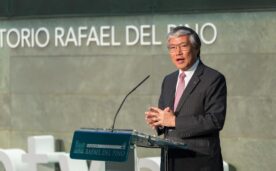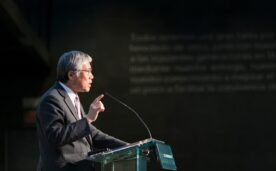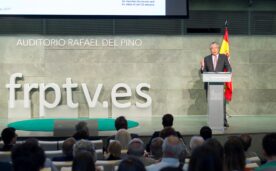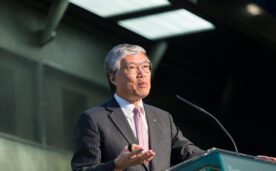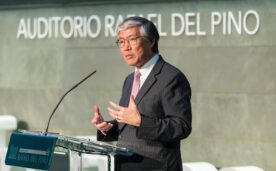The Other-half of Macroeconomics and the Fate of Globalization
Summary:
On 9 October 2017, the Rafael del Pino Foundation hosted a conference by Richard Koo, chief economist at Nomura Research Institute, on the macroeconomic situation and the future of globalisation. According to Richard Koo, political leaders and economic institutions are currently losing credibility around the world because there has been a disconnection between the economy and the economic policy actions of the authorities and institutions that manage the economy. Today the world finds itself in a situation that is outside the economics taught in universities, a situation in which the productive sectors do not seek to maximise their profits, but to minimise their debts. And this is the main reason why the economy is not moving. During the real estate bubble, companies borrowed a lot of money and now they have to pay it back. The right thing to do in this situation is to use cash flow to pay off debts. The problem is that when everyone behaves in this way, the economy shrinks, even if interest rates are very low. This is similar to the situation after the stock market crash of October 1929. What is happening is that, despite zero or negative interest rates, the private sector is not borrowing money. As a result, the injections of money being made by central banks are not translating into increases in the money supply and, therefore, money is not flowing into the real economy. This is happening in the US, the Eurozone, Japan and the UK. This is why inflation in these areas remains very low. Companies are not demanding credit because they are rebuilding their balance sheets. When they have finished doing so, they tend not to borrow again because the memory of the difficulties that companies have gone through, due to over-indebtedness, are very recent and are very present in their decision making. Moreover, at the moment the levels of return on capital in emerging countries are higher than in developed economies, so investments are going there. As a result, if you don't invest in a country, there is no demand for credit. To overcome this situation we need to change our thinking in terms of economic policy and do it in the opposite way to what was done during the golden age of capitalism. During that period, monetary policy played a major role in order to contain inflation, while fiscal policy played a minor role. Instead, what should be done now is to accompany monetary stimulus with fiscal stimulus, such as Donald Trump's promised infrastructure investment plan for the United States. In this sense, the government needs to act as a borrower of last resort and make investments that pay off. It should even force domestic savers, or the country's financial institutions, to buy government debt issued by the government to finance such spending programmes. To be able to do this in the Eurozone would require the European authorities to realise that, in the current situation of balance sheet recession, it is necessary to allow more public deficits in order to stimulate the economy through public investment programmes.
The Rafael del Pino Foundation is not responsible for the comments, opinions or statements made by the people who participate in its activities and which are expressed as a result of their inalienable right to freedom of expression and under their sole responsibility. The contents included in the summary of this conference are the result of the debates held at the meeting held for this purpose at the Foundation and are the responsibility of their authors.
The Rafael del Pino Foundation is not responsible for any comments, opinions or statements made by third parties. In this respect, the FRP is not obliged to monitor the views expressed by such third parties who participate in its activities and which are expressed as a result of their inalienable right to freedom of expression and under their own responsibility. The contents included in the summary of this conference are the result of the discussions that took place during the conference organised for this purpose at the Foundation and are the sole responsibility of its authors.
